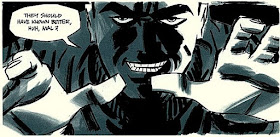Whenever I've engaged someone in The Talking Cure, it's usually been a person with a religious background not too dissimilar from my own. If I'm expected to broach vulnerable subject matter, religious discussion is inevitable, and most of the ground rules take far too long to explain to the uninitiated. More to the point, I finally have difficulty placing the necessary trust in someone who stands
completely outside my experience.
My last go-round with a religiously observant counselor, however, raised some unanticipated difficulties. We started by unpacking the
train case: a small-town boy moves to big city to even smaller town; the gender
role reversal; the
religious background — the present religious conviction — perhaps a few issues with . . . .
Wup: we had to stop, back up and unpack “religion” for a few minutes, possibly dipping into the
steamer trunk. After a few minutes' discussion, my would-be shrink's bottom line on the issue was, “It's about your relationship with God.”
I knew immediately this was our final conversation. It wasn't that I disagreed with the sentiment: I had trouble with the voice — the tonality — in which it was expressed. Had I wished to go further with this person, my responding tonality would have been, roughly, “That is a subjective sentiment posing as an objectively secure dogma. So long as this (my perspective) doesn't threaten to derail our conversation, we can continue.” My sense, however, was that I was now the guy who was standing outside.
Alright, let's cut to the review I agreed to do.
TheOOZE.com, a
site I've occasionally found thought-provoking (although at the moment its culture content seems to have lapsed into “Is U2 cool, or what?” mode) is attempting to generate “viral blogging” (
link) wherein a group of bloggers who have touched on Christian themes review books of a similar nature — purpose-driven blogging, you might say. Since the talking cure wasn't getting me anywhere, I figured I'd gamble someone else's stamp and give this a go. I had four titles to choose from.
Carl McColman's Spirituality: A Postmodern & Interfaith Approach To Cultivating A Relationship With God (
A) was the one I finally asked for.
Upon receiving the book, my first temptation was to review and critique the subtitle (which in one deft summary raises every single one of my intellectual hackles) and leave it at that. But McColman, who in his introduction claims to have been inspired while listening to the music of
evo-bio enthusiast Brian Eno, went through a hell of a lot of work to cable-knit a world-view that might, in turn, regenerate a little cerebral warmth which might, in turn, generate a “deeper spirituality.”
Argh. Already with the scare-quotes. Suffice it to say I found the bulk of McColman's intellectual argument, which is generated largely from etymological riffage, to be unpersuasive. Yet 200 pages later, in spite of all my internal kvetching (or "kicking against
the goads" if you prefer), I found myself in complete agreement with his final chapter, "Cultivating The Practice," which summarizes in 12 concise suggestions the author's idea of how best to live a good life.*
The trouble with me as an audience is, I am more predisposed to allow rhetorical argument to
dissuade me of fallacy than I am to have the method persuade me of a new, seemingly more enlightened tack. Perhaps that's just the
Rortyan in me. I also think
stories are more fecund and persuasive material. McColman, who claims a Protestant upbringing, followed by a Pagan change of heart, followed by a turning to Catholicism in later life, must surely have some interesting and even compelling stories to tell. I'm curious enough that I might just pick up his later work,
The Aspiring Mystic (
A) which he promotes as story-driven. In the meantime he and the "viral blogging" initiative are all about The Conversation, which I also endorse.
Here is McColman's website.
John Morehead is also generating some provocative discussion among some of the same groups of people: Christians, Mormons, Neo-Pagans, Wiccans — just about anyone, really. Morehead's blog is
here.
And, if I've somehow persuaded you to make up your own mind about
Spirituality, I encourage you to read it in tandem with
Christine Wicker's Not In Kansas Anymore: Dark Arts, Sex Spells, Money Magic, and Other Things Your Neighbors Aren't Telling You (
A) which is jam-packed with the sorts of stories I'm after, including Wicker's own. Just brace yourself for the dreams.
*McColman's Twelve Suggestions:
1. Pray or meditate daily
2. Engage in spiritual reading or study
3. Find an anamchara
(soul friend)
4. Join a healthy faith community
5. Cultivate beauty in your life
6. Engage in some sort of personal improvement program
7. Tithe
8. Honor some form of Sabbath
9. Relate charitably to those who are needy
10. Actively seek political solutions to complete the ministry of charity
11. Seek ways to interact with persons from other traditions
12. Maintain equilibrium and a sense of humor regarding your discipline








